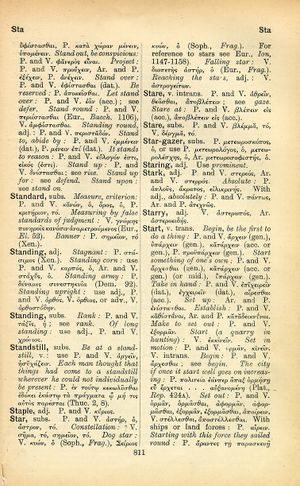start: Difference between revisions
Δρυὸς πεσούσης πᾶς ἀνὴρ ξυλεύεται → Quercu cadente, nemo ignatu abstinet → Fiel erst die Eiche, holt ein jeder Mann sich Holz
m (Text replacement - "<b class="b2">Eq.</b>" to "''Eq.''") |
mNo edit summary |
||
| Line 18: | Line 18: | ||
<b class="b2">Set in motion</b>: P. and V. ὁρμᾶν, κινεῖν. | <b class="b2">Set in motion</b>: P. and V. ὁρμᾶν, κινεῖν. | ||
V. intrans. [[begin]]: P. and V. ἄρχεσθαι; see [[begin]]. | '''V. intrans.''' | ||
[[begin]]: P. and V. ἄρχεσθαι; see [[begin]]. | |||
<b class="b2">The city if once it start well goes on increasing</b>: P. [[πολιτεία]] [[ἐάνπερ]] [[ἅπαξ]] ὁρμήσῃ [[εὖ]] ἔρχεται... αὐξανομένη (Plat., ''Rep.'' 424A). | <b class="b2">The city if once it start well goes on increasing</b>: P. [[πολιτεία]] [[ἐάνπερ]] [[ἅπαξ]] ὁρμήσῃ [[εὖ]] ἔρχεται... αὐξανομένη (Plat., ''Rep.'' 424A). | ||
Revision as of 16:59, 7 August 2017
English > Greek (Woodhouse)
v. trans.
Begin, be the first to do a thing: P. and V. ἄρχειν (gen.), ὑπάρχειν (gen.) , κατάρχειν (acc. or gen.), P. προϋπάρχειν (gen.).
Start something of one's own: P. and V. ἄρχεσθαι (gen.), κατάρχειν (acc. or gen.) (or mid.), ὑπάρχειν (gen.).
Take in hand: P. and V. ἐπιχειρεῖν (dat.), ἐγχειρεῖν (dat.), αἴρεσθαι (acc.).
Set up: Ar. and P. ἐνίστασθαι.
Establish: P. and V. καθιστάναι, Ar. and P. καταδεικνύναι.
Make to set out: P. and V. ἐξορμᾶν.
Start (a quarry in hunting): V. ἐκκινεῖν.
Set in motion: P. and V. ὁρμᾶν, κινεῖν.
V. intrans.
begin: P. and V. ἄρχεσθαι; see begin.
The city if once it start well goes on increasing: P. πολιτεία ἐάνπερ ἅπαξ ὁρμήσῃ εὖ ἔρχεται... αὐξανομένη (Plat., Rep. 424A).
Set out: P. and V. ὁρμᾶν, ὁρμᾶσθαι, ἀφορμᾶν, ἀφορμᾶσθαι, ἐξορμᾶν, ἐξορμᾶσθαι, ἀπαίρειν, V. στέλλεσθαι, ἀποστέλλεσθαι.
With ships or land forces: P. αἴρειν.
Starting with this force they sailed round: P. ἄραντες τῇ παρασκευῇ ταύτῃ περιέπλεον. (Thuc. 2, 23).
I would have you save the money with which I started: V. σῶσαί σε χρήμαθʼ οἷς συνεξῆλθον θέλω (Eur., Hec. 1012).
Be startled: P. and V. φρίσσειν, τρέμειν, ἐκπλήσσεσθαι.
Start up: P. and V. ἀνίστασθαι, ἐξανίστασθαι, P. ἀνατρέχειν, Ar. and V. ἀνᾴσσειν (also Xen. but rare P.).
To start with, at first: P. and V. τὸ πρῶτον; see under first.
subs.
Beginning: P. and V. ἀρχή, ἡ.
Journey: P. and V. ὁδός, ἡ.
Putting out to sea: P. ἀναγωγή, ἡ.
Get a start, v.: P. and V. φθάνειν, προφθάνειν.
Get the start of: P. and V. φθάνειν (acc.), προφθάνειν (acc.), προλαμβάνειν (acc.), P. προκαταλαμβάνειν (acc.).
The trireme had a start of about a day and a night: P. (ἡ τριήρης) προεῖχε ἡμέρᾳ καὶ νυκτὶ μάλιστα (Thuc. 3, 49).
Let me and him have a fair start that we may benefit you on equal terms: Ar. ἄφες ἀπὸ βαλβίδων ἐμὲ καὶ τουτονὶ ἵνα σʼ εὖ ποιῶμεν ἐξ ἴσου (Eq. 1159).
Shudder: P. and V. τρόμος, ὁ.
Give one a start: use P. and V. ἔκπληξιν παρέχειν (dat.).

